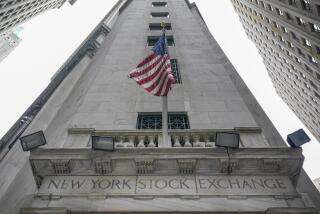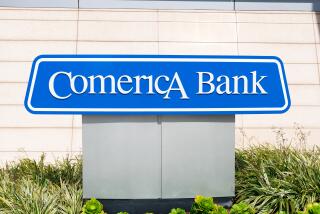Citigroup, UBS feel sting of mortgage woes
- Share via
The sub-prime mortgage fiasco and the resulting jolt to credit markets reverberated around the world again Monday as giant Swiss bank UBS and New York’s Citigroup Inc. said they would take billions of dollars in charges related to bad loans to high-risk U.S. homeowners.
Nevertheless, Citigroup and UBS shares rose as the chief executives of both companies said they expected improved results in the current quarter, and the Dow Jones industrial average hit a new high as investors seemed to bet that the worst had passed.
Citigroup, the largest U.S. bank, said it would write off $5.9 billion for the third quarter because of expected losses on mortgage and consumer banking and because it had been unable to sell securities backed by mortgages and corporate-takeover loans. It said its third-quarter profit, to be announced this month, would slide 60% from last year’s $5.5 billion.
UBS announced $3.4 billion in write-downs, including deep mortgage losses at a hedge fund it operated, and said it would report its first quarterly loss in nine years. It slashed 1,500 jobs and ousted the head of its U.S. investment banking operations, saying its new CEO, Marcel Rohner, would run the division.
As for the rest of the year, Rohner said, “we expect a positive fourth quarter.”
UBS rival Credit Suisse Group also said Monday that its investment banking and asset management operations had suffered in the third quarter but that the company would still record a profit for the period.
The bad news for Citigroup and UBS comes after a rough quarter in which financial stocks slumped amid uncertainty about the extent of losses from the credit and sub-prime mortgage turmoil.
Sub-prime-related woes have hit banks in Germany, France and Britain. In the U.S., the problems have forced scores of mortgage companies to shut down, such as Irvine’s New Century Financial Corp., or quit making sub-prime home loans, such as Fremont General Corp. of Santa Monica.
The Citigroup and UBS write-offs far exceed those at other Wall Street firms with sub-prime exposure, including Bear Stearns Cos. and Lehman Bros. Holdings Inc., that reported financial results last month. But analysts expect large sub-prime write-downs this month at Bank of America Corp., JPMorgan Chase & Co. and Merrill Lynch & Co. as well.
Citigroup CEO Charles Prince said Monday that he was “obviously very disappointed” in the results but added that a “more normal earnings environment” should prevail in the fourth quarter.
Former Federal Reserve Chairman Alan Greenspan also sounded an optimistic note Monday, saying the August-to-September credit crunch “possibly” is about to end.
Citigroup stock rose $1.05 to $47.72, while UBS was up $1.69 to $54.94 as investors apparently decided that the big charges would put the banks’ sub-prime blues in the past tense. Bank of America analyst Michael Hecht said UBS’ “kitchen sink” write-downs would “likely clear the decks for a lift in results” in the fourth quarter and beyond.
One skeptic was analyst Richard Bove of Punk, Ziegel & Co., who had downgraded Citigroup in July. Bove contended that the evaporation of the markets for securities carved out of sub-prime mortgages and takeover loans -- areas of huge growth for big banks this decade -- would continue to depress the banks’ earnings.
Bove compared Prince to former Citi CEO John S. Reed, who in 1987 added a then-staggering $3 billion to the bank’s reserves against losses in developing nations and declared the problem solved. Reed called it “the write-offs to end all write-offs,” Bove recalled.
But in 1991, Reed, forced to set aside additional funds for losses in Latin America, eliminated the bank’s dividend, Bove said.
Like Reed, Prince may have an imperfect vision of the future, Bove said. “It’s not just a write-off we’re talking about here; it’s a change in the structure of the market.”
Large as the Citigroup write-off was, it’s still far smaller than the huge sub-prime losses suffered by HSBC Holdings, Europe’s largest bank.
HSBC, which purchased the Household and Beneficial finance companies in 2003 and turned the sub-prime lenders into HSBC Finance Corp., was forced in February to raise its provisions for bad loans by $10.5 billion, mainly because of delinquencies on adjustable-rate sub-prime loans. It fired its top U.S. managers.
Last month, HSBC said it would close its Decision One Mortgage unit, which makes loans through independent mortgage brokers, and eliminate 750 jobs. (The storefront retail operations of Household and Beneficial, which are several times the size of Decision One, remain in business.)
Also last month, Britain’s fifth-largest mortgage lender, Northern Rock, suffered a $4-billion run on its deposits after it had trouble rounding up financing because fears about the U.S. sub-prime market had caused credit to tighten worldwide.
Northern Rock, which needed an emergency loan from Britain’s central bank to survive, had been relying on borrowing from other institutions to finance its loans. But the cost of that funding jumped sky-high as the credit markets contracted.
On Monday, Northern Rock shares fell 26% on reports that only hedge funds or other speculative investors would be interested in buying Northern Rock -- and only at a fire-sale price.
“The main banks don’t seem to be interested,” an unidentified analyst told the Reuters news service in London. “And the longer it is left, the more the franchise gets eroded.”
Meanwhile, British officials said Monday that they would extend the guarantee on cash deposits up to 35,000 pounds ($71,500) in all bank accounts. The government-organized system to protect savings in failed banks currently pays back 100% of the first 2,000 pounds and 90% of deposits up to 33,000 pounds.
Prime Minister Gordon Brown said the government needed to make such changes to ensure economic stability in the wake of the run on Northern Rock.
--
walter.hamilton@latimes.com
--
(BEGIN TEXT OF INFOBOX)
Global crunch
U.S. sub-prime woes have been felt around the world in recent months.
In Germany, two banks have needed bailouts. In July, the government helped broker a rescue package for lender IKB. State bank SachsenLB almost went under because of the sub-prime crisis in August and was quickly sold to a rival.
In France, BNP Paribas in August blocked investors from pulling $2.2 billion from three funds that had invested in securities backed by U.S. sub-prime mortgages because it said “the complete evaporation of liquidity in certain market segments” made it impossible to accurately value the funds’ assets.
In Britain, London-based HSBC Holdings was forced in February to raise its provisions for bad loans to $10.5 billion, mainly because of delinquencies on adjustable sub-prime loans. It fired its top U.S. managers. Last month, the Bank of England stepped in to help lender Northern Rock, promising emergency funds after the global credit crunch tied to the sub-prime woes hit the bank’s ability to raise cash in money markets. Spooked depositors lined up to withdraw funds.
In Switzerland, giant bank UBS said Monday that it was taking a $3.4-billion write-down and cutting 1,500 jobs after a deep loss in an internal hedge fund caused partially by mortgage-related losses.
Sources: Times staff and wire reports
More to Read
Inside the business of entertainment
The Wide Shot brings you news, analysis and insights on everything from streaming wars to production — and what it all means for the future.
You may occasionally receive promotional content from the Los Angeles Times.











